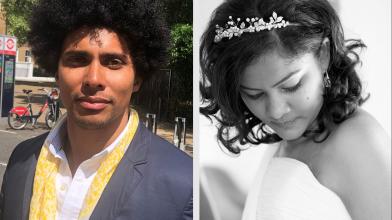Widower wins right to have baby using embryo created with his late wife
The UK high court’s family division ruled that Jennings can use the embryo, in what could be the UK's first case of posthumous surrogacy.

A 38-year-old widower has won a landmark legal case giving him the right to have a baby with a surrogate using the last remaining embryo created with his late wife.
Ted Jennings and his wife, Fern-Marie Choya, had spent years trying to have children and had sought fertility treatment, but Choya died suddenly while pregnant with twin girls in 2019.
The fertility regulator, the Human Fertilisation and Embryology Authority (HFEA), rejected Jennings’s request to be able to use their last frozen embryo to start a family because Choya had not given written consent for posthumous surrogacy.
But on Wednesday, the UK high court’s family division ruled that Jennings can use the embryo, in what could be the UK's first case of posthumous surrogacy.
The couple had not been given adequate opportunity to consent to this scenario, the court found, in a judgment that will put pressure on the HFEA to review consent procedures.
In her judgment, Mrs Justice Theis, a family division judge, said: “I am satisfied that, in the circumstances of this case, the court can infer from all the available evidence that Ms Choya would have consented to Mr Jennings being able to use their partner-created embryo in treatment with a surrogate in the event of her death. This is being considered in the context where, in my judgment, she had not been given relevant information and/or a sufficient opportunity to discuss it with the clinic.”
The couple, both originally from Trinidad, met in London and married in 2009. After five years of fertility treatment and two miscarriages following ectopic pregnancies, they conceived in 2018 and were expecting twin girls. But 18 weeks into her pregnancy, Choya suffered a severe pregnancy complication and died, aged 40.
The couple had given consent to the embryos being used in the event of Jennings’s death, the court heard in evidence last month, but Choya was not asked the equivalent question. Instead, her form stated that she should seek more information from the clinic “if you wish your eggs or embryos to be used in someone else’s treatment if you die”.
The court ruled that it was “far from clear” how this related to posthumous surrogacy and suggested that the HFEA “may want to consider whether the form should be reviewed in order to provide the clarity required and avoid this situation occurring again”.
James Lawford Davies, Jennings’s lawyer, and a partner at the firm Hill Dickinson said: “I am delighted that the court has found in Ted’s favour and that he can now proceed with surrogacy treatment. It was clear that this is what Fern would have wanted and this very thorough judgment allows her wishes to be respected.”
In a statement, the HFEA said: “This is a tragic case and the HFEA continues to have every sympathy for Mr Jennings. The act of parliament which governs fertility and embryology in the UK is clear that signed written consent is always required in such cases. The risk today is that this decision will undermine that position, and diminish the protection it gives to a person’s express wishes about the use of their embryos after their death. We will carefully consider the judgment before deciding whether to appeal.”


